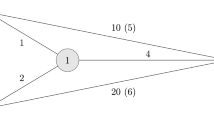Abstract
We investigate the cost allocation strategy associated with the problem of providing service among network users residing at nodes of a social network. We assume that the social network platform is established in a symmetric complete network. There is a cost associated with each link and the service between any pair of nodes can be delivered via a directed path. The example of a cost efficient solution for such network is a (non-rooted) minimum cost directed spanning tree. The network cost should be distributed among users who might have conflicting interests. The objective of this paper is to formulate the above cost allocation problem as a cooperative game, to be referred to as a Social Enterprise Tree Network (SETN) game, and develop a “fair” and efficient cost allocation scheme. The SETN game is related to the minimum cost spanning tree game. The profound difference is that in the minimum cost spanning tree game the service is delivered from some common source node to the rest of the network, while under the social network platform there is no source and the service is established through the interaction among all participating nodes. The input to our cost allocation problem is the optimal non-rooted directed spanning tree SETN. We formulate several associated SETN games in characteristic function form. Then we construct a couple of efficient cost allocation algorithms that find some points in the core of those SETN games and thus result in subsidy-free cost allocations.




Similar content being viewed by others
References
Bergantinos, G., & Vidal-Puga, J. (2015). Characterization of monotonic rules in minimum cost spanning trees. International Journal of Game Theory, 44(4), 1–34.
Bird, S. (1976). On cost allocation for a spanning tree: a game theoretic approach. Networks, 6, 335–350.
Dutta, B., & Kar, A. (2004). Cost monotonicity, consistency and minimum cost spanning tree games. Games and Economic Behavior, 48, 223–248.
Faigle, U., Kern, W., Fekete, S. P., & Hochstattler, W. (1997). On the complexity of testing membership in the core of min-cost spanning tree games. International Journal of Game Theory, 26, 361–366.
Granot, D. (1986). A generalized linear production model: A unifying model. Mathematical Programming, 34, 212–223.
Granot, D., & Granot, F. (1992). On some network flow games. Mathematics of Operations Research, 17(4), 792–841.
Granot, D., & Huberman, G. (1981). Minimum cost spanning tree games. Mathematical Programming, 21, 1–18.
Granot, D., & Huberman, G. (1984). On the core and nucleolus of the M.C.S.T. games. Mathematical Programming, 29, 323–347.
Jain, K., & Vazirani, V. V. (2001). “Applications of Approximation Algorithms to Cooperative Games, STOC’01”, July 6–8, Hersonissos, Crete, Greece.
Lorenzo, L., & Lorenzo-Freire, S. (2009). A characterization of Kruskal sharing rules for minimum cost spanning tree problems. International Journal of Game Theory, 38(1), 107–126.
Megiddo, N. (1978). Computational complexity and the game theory approach to cost allocation for a tree. Mathematics of Operations Research, 3, 189–196.
Nisan, N., Roughgarden, T., Tardos, E., & Vazirani, V. (Eds.). (2007). Algorithmic game theory. Cambridge: Cambridge University Press.
Norde, H., Moretti, S., & Tijs, S. (2004). Minimum cost spanning tree games and population monotonic cost allocation schemes. European Journal of Operational Research, 154, 84–97.
Potters, J. A. M., Curiel, I. J., & Tijs, S. H. (1987). Traveling salesman games. Mathematical Programming, 53, 199–211.
Skorin-Kapov, D. (1993). On a cost allocation problem arising from a capacitated concentrator covering problem. Operations Research Letters, 13(5), 315–323.
Skorin-Kapov, D. (1995). On the core of the minimum Steiner tree game in networks. Annals of Operations Research, 57, 233–249.
Skorin-Kapov, D. (1998a). On some cost allocation problems in communication networks. Mathematical Communications, 3, 85–94.
Skorin-Kapov, D. (1998b). Hub network games. Networks, 31, 293–302.
Skorin-Kapov, D. (2010). On primal-dual cost allocation schema in multicast communication: Combinatorial game theory model. In: Proceedings of The 17th international conference on industrial engineering and engineering management, Xiamen, P.R. China, IEEE Press, (pp. 433-438).
Skorin-Kapov, D., & Beltran, H. F. (1994). An efficient characterization of cost allocation solutions associated with capacitated network design problems. Telecommunication Systems, 3(1), 91–107.
Skorin-Kapov, D., & Skorin-Kapov, J. (2005). Threshold based discounting network: The cost allocation provided by the nucleolus. European Journal of Operations Research, 166(1), 154–159.
Skorin-Kapov, D., & Skorin-Kapov, J. (2012). A note on Steiner tree games. Networks, 59(2), 215–225.
Tamir, A. (1991). On the core of network synthesis game. Mathematical Programming, 50, 123–135.
Vazirani, V. V. (2000). Recent results on approximating the Steiner tree problem and its generalizations. Theoretical Computer Science, 235, 205–216.
Author information
Authors and Affiliations
Corresponding author
Rights and permissions
About this article
Cite this article
Skorin-Kapov, D. Social enterprise tree network games. Ann Oper Res 268, 5–20 (2018). https://doi.org/10.1007/s10479-017-2460-0
Published:
Issue Date:
DOI: https://doi.org/10.1007/s10479-017-2460-0




